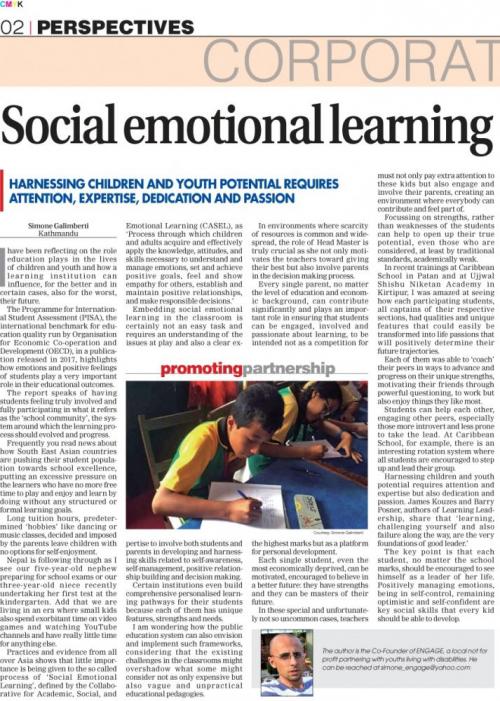
I have been reflecting on the role education plays in the lives of children and youths and how a learning institution can influence, for the better and in certain cases, also for the worst, their future.
The Program for International Student Assessment (PISA), the international benchmark for education quality run by Organization for Economic Co-operation and Development (OECD), in a publication released in 2017, highlights how emotions and positive feelings of students play a very important role in their educational outcomes.
The report speaks of having students feeling truly involved and fully participating in what it refers as the “school community”, the system around which the learning process should evolved and progress.
Frequently you read news about how South East Asian countries are pushing their student population towards school excellence, putting an excessive pressure on the learners who have no more free time to play and enjoy and learn by doing without any structured or formal learning goals.
Long tuition hours, predetermined “hobbies” like dancing or music classes decided and imposed by the parents leave children with no options for truly self-enjoyment.
Nepal is following through as I see our five years old nephew preparing for school exams or our three years old niece recently undertaking her first test at the kindergarten.
Add that we are living in an era where also small kids spend exorbitant time on video games and watching You Tube channels and have really little time for anything else.
Practices and evidence from all over Asia shows that little importance is being given to the so called process of “Social Emotional Learning”, defined by the Collaborative for Academic, Social, and Emotional Learning (CASEL), as “process through which children and adults acquire and effectively apply the knowledge, attitudes, and skills necessary to understand and manage emotions, set and achieve positive goals, feel and show empathy for others, establish and maintain positive relationships, and make responsible decisions.”
Embedding social emotional learning in the classroom is certainly not an easy task and requires an understanding of the issues at play and also a clear expertise to involve both students and parents in developing and harnessing skills related to self-awareness, self-management, positive relationship building and decision making.
Certain institutions even build comprehensive personalized learning pathways for their students because each of them has unique features, strengths and needs.
I am wondering how the public education system can also envision and implement such frameworks, considering that the existing challenges in the classrooms might overshadow what some might consider not as only expensive but also vague and unpractical educational pedagogies.
In environments where scarcity of resources is common and widespread, the role of Head Masters is truly crucial as she not only motivate the teachers towards giving their best but also involve parents in the decision making process.
Every single parent, no matter the level of education and economic background, can contribute significantly and plays an important role in ensuring that students can be engaged, involved and passionate about learning, to be intended not as a competition for the highest marks but as a platform for personal development.
Each single student, even the most economically deprived, can be motivated, encouraged to believe in a better future: they have strengths and they can be masters of their future.
In these special and unfortunately not so uncommon cases, teachers must not only pay extra attention to these kids abut also engage and involve their parents, creating an environment where everybody can contribute and feel part of.
Focusing on the strengths, rather than the weaknesses of the students can help opening up the true potential of the students, even those who are considered, at least by traditional standards, academically weak.
In recent trainings at Caribbean School in Patan and at Ujjwal Shishu Niketan Academy in Kirtipur, I was amazed at seeing how each participating students, all captains of their respective sections, had qualities and unique features that could easily be transformed into life passions that will positively determine their future trajectories.
Each of them was able to “coach” their peers in ways to advance and progress on their unique strengths, motivating, through powerful questioning, their friends to work but also enjoy harder on the things they like most.
Students can help each other, engaging other peers, especially those more introvert and less prone to take the lead.
At Caribbean School, for example, there is an interesting rotation system where all students are encouraged to step up and lead their group.
Harnessing children and youth potential requires attention, expertise but also dedication and deep passion.
James Kouzes and Barry Posner, authors of Learning Leadership, share that “learning, challenging yourself and also failure along the way, are the very foundations of good leader”.
The key point is that each single student, no matter the school marks, should be encouraged to see herself as a leader of her life.
Positively managing emotions and be in self-control, remain optimistic and self-confident are key social skills that every kid should be able to develop.










Add new comment